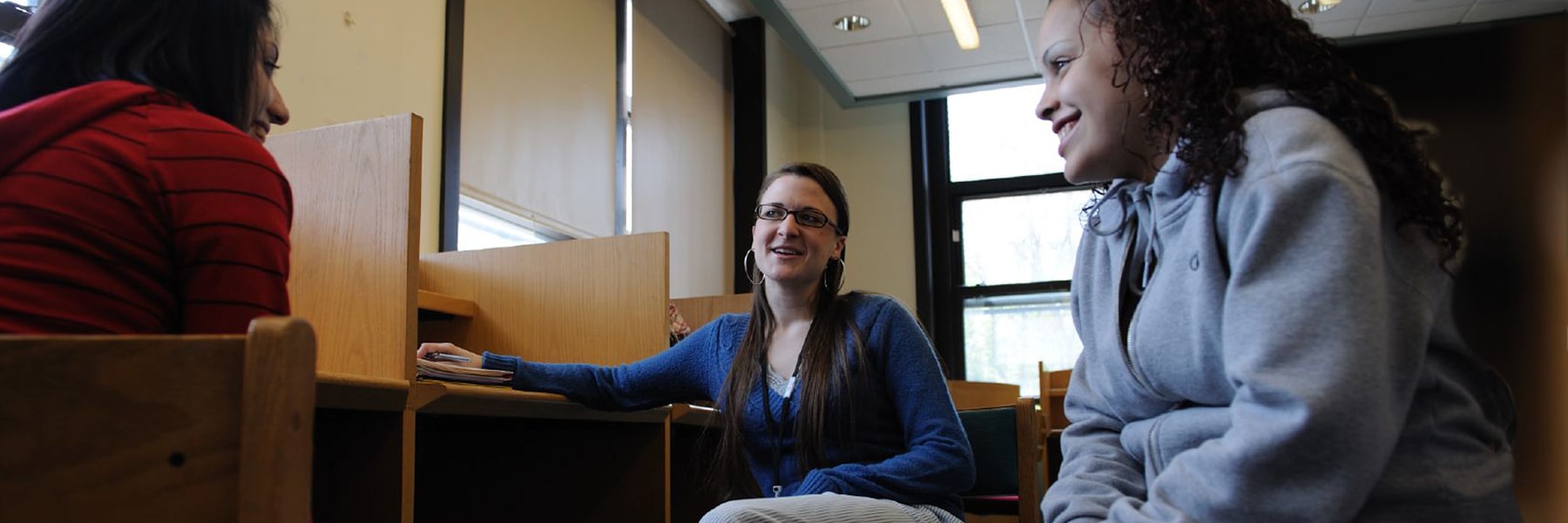Plan Your Education
How to Apply
Apply for Admission
Please review the first-year and transfer apply pages for important information about application requirements, deadlines, and application status check.
Financing Your Education
Become a Beacon and pursue your passion in UMass Boston’s diverse, supportive environment. Many students across our 200+ undergraduate and graduate programs receive financial aid—providing access to an education that’s exceptional and affordable. Click below to learn more about financial aid opportunities and deadlines.
Financial Aid Deadlines & Application Process
Scholarships for First-Year & Transfer Students
Deadlines & Cost
Early action deadline: November 1; Regular Decision Deadline: June 15
Financing Your Education
Become a Beacon and pursue your passion in UMass Boston’s diverse, supportive environment. Many students across our 200+ undergraduate and graduate programs receive financial aid—providing access to an education that’s exceptional and affordable. Click below to learn more about financial aid opportunities and deadlines.
Financial Aid Deadlines & Application Process
Scholarships for First-Year & Transfer Students
For additional information regarding tuition and fees, please visit the Bursar’s Office or send an email to Bursar@umb.edu.
Curriculum
Introductory Psychology Courses (6 to 7 Credits):
Take two courses from the list below.
- PSYCH 100 - Introductory Psychology 3 Credit(s)
or - PSYCH 101 - Introductory Psychology 4 Credit(s)
- PSYCH 201 - Introduction to Behavioral Research 3 Credit(s)
Intermediate Psychology Courses (15 Credits):
Take one course from each category below.
Personality/Clinical:
- PSYCH 210 - Personality 3 Credit(s)
or - PSYCH 215 - Abnormal Psychology 3 Credit(s)
Social Psychology:
- PSYCH 230 - Social Psychology 3 Credit(s)
Developmental:
- PSYCH 241 - Infancy and Childhood Development 3 Credit(s)
or - PSYCH 242 - Adolescence 3 Credit(s)
Cognitive:
- PSYCH 250 - Learning and Memory 3 Credit(s)
or - PSYCH 255 - Perception 3 Credit(s)
Psychobiology:
- PSYCH 360 - Behavioral Neuroscience 3 Credit(s)
Psychology Statistics Course (3 Credits):
- PSYCH 370 - Statistics 3 Credit(s)
Experimental Method Psychology Course (3 Credits):
Take one course from the list below.
- PSYCH 466 - Hormones and Behavior 3 Credit(s)
- PSYCH 475 - Experimental Methods: Learning and Perception 3 Credit(s)
- PSYCH 476 - Experimental Methods: Physiological 3 Credit(s)
- PSYCH 477 - Experimental Methods: Social 3 Credit(s)
Advanced Psychology Courses (6 Credits):
Take two psychology courses at the 300-level or higher except for PSYCH 444, 487, 488, and 489. At least one course must be at the 400-level.
One 400-level course will be used as the psychology capstone and must have a grade of C- or higher. No more than one psychology research apprenticeship may be applied toward this requirement.
Psychology Elective (3 Credits):
Take any two additional psychology courses except for first year seminar courses and PSYCH 230.
Calculus Course (3 to 4 Credits):
Take MATH 135 - Survey of Calculus or a higher level calculus course.
Introductory Biology Courses (8 Credits):
- BIOL 111 - General Biology I 4 Credit(s)
- BIOL 112 - General Biology II 4 Credit(s)
Science Courses (12 to 16 Credits):
Take four science courses from the list below.
- BIOCHM 383 - Biochemistry I 3 Credit(s)
- BIOCHM 384 - Biochemistry II 3 Credit(s)
- BIOCHM 385 - Biochemistry Lab I 3 Credit(s)
- BIOCHM 386 - Biochemistry Lab II 3 Credit(s)
- BIOL 210 - Cell Biology 4 Credit(s)
- BIOL 212 - Cell Biology (Lecture) 3 Credit(s)
- BIOL 252 - Genetics 4 Credit(s)
- BIOL 254 - Genetics (Lecture) 3 Credit(s)
- BIOL 290 - Population Biology 3 Credit(s)
- BIOL 306 - Marine & Coastal Ecological Research 3 Credit(s)
- BIOL 313 - Developmental Biology and Embryology 4 Credit(s)
- BIOL 314 - Developmental Biol 3 Credit(s)
- BIOL 316 - Neurobiology 4 Credit(s)
- BIOL 317 - Endocrinology 4 Credit(s)
- BIOL 318 - Neurobiology (Lecture) 3 Credit(s)
- BIOL 319 - Endocrinology (Lecture) 3 Credit(s)
- BIOL 321 - Plant Physiology 4 Credit(s)
- BIOL 323 - Plant Physiology (Lecture) 3 Credit(s)
- BIOL 328 - Plant Life 4 Credit(s)
- BIOL 329 - Plant Life (Lecture) 3 Credit(s)
- BIOL 330 - Biology of Fishes 3 Credit(s)
- BIOL 333 - Biology of Marine Invertebrates (Lecture) 3 Credit(s)
- BIOL 334 - Microbiology 4 Credit(s)
- BIOL 335 - Genomics: Microbes, Human Biome and Other Metagenomes 3 Credit(s)
- BIOL 336L - Ecosystems Ecology 3 Credit(s)
- BIOL 337 - Comparative Animal Physiology 4 Credit(s)
- BIOL 338 - Insect Life 4 Credit(s)
- BIOL 339 - Comparative Animal Physiology (Lecture) 3 Credit(s)
- BIOL 340 - Marine Mammal Biology 3 Credit(s)
- BIOL 342 - Ecology 3 Credit(s)
- BIOL 348 - Animal Behavior 3 Credit(s)
- BIOL 352 - Evolution 3 Credit(s)
- BIOL 360 - Bioinformatics 3 Credit(s)
- BIOL 370 - Molecular Biology 4 Credit(s)
- BIOL 372 - Molecular Biology (Lecture) 3 Credit(s)
- BIOL 378 - Introduction to Immunology 4 Credit(s)
- BIOL 380 - Introduction to Immunology (Lecture) 3 Credit(s)
- BIOL 384L - Game Theory, Evolution and Ecology 3 Credit(s)
- CHEM 115 - Chemical Principles I Lecture 3 Credit(s)
- CHEM 116 - Chemical Principles II Lecture 3 Credit(s)
- CHEM 251 - Organic Chemistry I Lecture 3 Credit(s)
- CHEM 252 - Organic Chemistry II Lecture 3 Credit(s)
- CHEM 300 through 499
- CS 110 - Introduction to Computing 4 Credit(s)
- CS 210 - Intermediate Computing with Data Structures 4 Credit(s)
- CS 240 - Programming in C 3 Credit(s)
- CS 285L - Social Issues and Ethics in Computing 3 Credit(s)
- CS 310 - Advanced Data Structures and Algorithms 3 Credit(s)
- CS 220 - Applied Discrete Mathematics 3 Credit(s)
- CS 341 - Computer Architecture and Organization 3 Credit(s)
- CS 410 - An Introduction to Software Engineering 3 Credit(s)
- CS 420 - An Introduction to the Theory of Computation 3 Credit(s)
- CS 430 - Database Management 3 Credit(s)
- CS 436 - Database Application Development 3 Credit(s)
- CS 437 - Database-Backed Web Sites & Web Services 3 Credit(s)
- CS 438 - Applied Machine Learning 3 Credit(s)
- CS 443 - Mobile Applications 3 Credit(s)
- CS 444 - An Introduction to Operating Systems 3 Credit(s)
- CS 446 - Introduction to Internetworking 3 Credit(s)
- CS 449 - Introduction to Computer Security 3 Credit(s)
- CS 450 - The Structure of Higher Level Languages 3 Credit(s)
- CS 451 - Compilers 3 Credit(s)
- CS 460 - Graphics 3 Credit(s)
- CS 470 - An Introduction to Artificial Intelligence 3 Credit(s)
- ENGIN 103 - Introduction to Engineering 3 Credit(s)
- ENGIN 104 - Introduction to Electrical and Computer Engineering 3 Credit(s)
- ENGIN 202 - Statics (Mechanical Engineering) 3 Credit(s)
- ENGIN 211L - Engineering Mathematics 3 Credit(s)
- ENGIN 221 - Strength of Materials I 3 Credit(s)
- ENGIN 231 - Circuit Analysis I 3 Credit(s)
- ENGIN 232 - Circuit Analysis II 3 Credit(s)
- ENGIN 241 - Digital Systems with Lab 4 Credit(s)
- ENGIN 271 - Circuit Lab I 1 Credit(s)
- ENGIN 272 - Circuit Lab II 1 Credit(s)
- ENGIN 300 through 499
- ENVSCI 120 - Introduction to Environmental Science 3 Credit(s)
- ENVSCI 121 - Introduction to Environmental Science Lab 1 Credit(s)
- ENVSCI 122 - Introduction to Environmental Policy & Management 3 Credit(s)
- ENVSCI 210 - Earth’s Dynamic Systems 4 Credit(s)
- ENVSCI 226 - Introduction to Oceanography 3 Credit(s)
- ENVSCI 260 - Global Environmental Change 3 Credit(s)
- ENVSCI 267L - Introduction to Coastal Biological Systems 3 Credit(s)
- ENVSCI 270 - Cities and the Environment 3 Credit(s)
- ENVSCI 280 - Global Society and the Environment 3 Credit(s)
- ENVSCI 281 - Introduction to Geographic Information Systems 4 Credit(s)
- ENVSCI 305 - Hydrology 3 Credit(s)
- ENVSCI 316 - Coastal and Marine Pollution 3 Credit(s)
- ENVSCI 324 - Coastal Zone Management 3 Credit(s)
- ENVSCI 325 - Introduction to Biological Oceanography 3 Credit(s)
- ENVSCI 327 - Coastal Geology 3 Credit(s)
- ENVSCI 336L - Ecosystems Ecology 3 Credit(s)
- ENVSCI 340L - Planning and Land Use Law 3 Credit(s)
- ENVSCI 345L - Natural Resources & Sustainable Development 3 Credit(s)
- ENVSCI 349L - Economic Approaches to Environmental Problems 3 Credit(s)
- ENVSCI 364 - Environmental Management and Sustainability 3 Credit(s)
- ENVSCI 372 - Introduction to Remote Sensing 3 Credit(s)
- ENVSCI 375L - Urban Planning 3 Credit(s)
- ENVSCI 381 - GIS Applications and Spatial Databases 4 Credit(s)
- ENVSCI 383 - Water Resources Management: Principles, practices, and problems. 3 Credit(s)
- ENVSCI 384 - Climate and Energy: Law, Policy, and Management 3 Credit(s)
- ENVSCI 406 - GIT Data Collection and Field Methods 4 Credit(s)
- IT 110 - Information Technology Problem Solving 3 Credit(s)
- IT 111L - Managerial Statistics 3 Credit(s)
- IT 114L - Introduction To Java 3 Credit(s)
- IT 220 - Computer Forensics I 3 Credit(s)
- IT 221 - Computer Forensics II 3 Credit(s)
- IT 230L - Relational Databases 3 Credit(s)
- IT 240 - Web Fluency 3 Credit(s)
- IT 244 - Introduction to Linux/Unix 3 Credit(s)
- IT 246 - Introduction to Networks 3 Credit(s)
- IT 285L - Social Issues and Ethics in Computing 3 Credit(s)
- IT 341 - Introduction to System Administration 3 Credit(s)
- IT 360 - Enterprise Software 3 Credit(s)
- IT 370 - Introduction to Analytics 3 Credit(s)
- IT 420 - Network and Mobile Forensics 3 Credit(s)
- IT 421 - Digital Forensics/Malware Analysis 3 Credit(s)
- IT 425L - Project Management 3 Credit(s)
- IT 428L - Information System Security 3 Credit(s)
- IT 441 - Network Services Administration 3 Credit(s)
- IT 442 - Windows System Administration 3 Credit(s)
- IT 443 - Network Security Administration I 3 Credit(s)
- IT 456 - Information Storage and Management 3 Credit(s)
- IT 460 - Integration Methodologies and Tools 3 Credit(s)
- IT 461L - Systems Analysis and Design 3 Credit(s)
- IT 471 - Data Warehousing for Business Intelligence 3 Credit(s)
- IT 472 - Data Mining for Management Applications 3 Credit(s)
- IT 485 - Information Technology Capstone 3 Credit(s)
- MATH 140 - Calculus I 4 Credit(s)
- MATH 141 - Calculus II 4 Credit(s)
- MATH 242 - Multivariable and Vector Calculus 4 Credit(s)
- MATH 260 - Linear Algebra I 3 Credit(s)
- MATH 300 through 499
- PHYSIC 113 - Fundamentals of Physics I 4 Credit(s)
- PHYSIC 114 - Fundamentals of Physics II 4 Credit(s)
- PHYSIC 211 - Introduction to Contemporary Physics 3 Credit(s)
- PHYSIC 214 - Thermodynamics 3 Credit(s)
- PHYSIC 281 - Physical Laboratory I 3 Credit(s)
- PHYSIC 300 through 499
Graduation Criteria
Program Declaration
At time of admission to the University or by completion of an Undergraduate Program Add/Change form.
Degree Requirements
f this is the student’s only or primary major, the degree requirements below must be completed for graduation. See graduation requirements for more information.
Related Minors
Cognitive Science Minor
Support your career goals by supplementing your degree with a minor in cognitive science.
Contact
Location: McCormack Hall, Floor: 04, Room: 00206
Phone: 617-287-6350
Department Manager and Advising Coordinator: Michelle Browning
Phone: 617-287-6351
Assistant to the Chair: Sangya Dhungana
Phone: 617-287-6352
Grants & Contracts Administrator: Annie McCluskey
Phone: 617-287-3276
Director of Labs: Eric Berry
Phone: 617-287-6399
Lab Technician:
Phone: 617-287-7917
Assistant Director, Clinical Psychology PhD Program: Brooke Craveiro
Phone: 617-287-6340
Graduate Program Coordinator, Developmental and Brain Sciences PhD Program: Rouzan Khachatourian
Phone: 617-287-6350

Psychology
Learn more about UMass Boston's Psychology department, our research, and our faculty.
Explore the Department of Psychology
College of Liberal Arts
Learn more about the faculty, research, and programs that make up our College of Liberal Arts.
Explore the College of Liberal Arts
